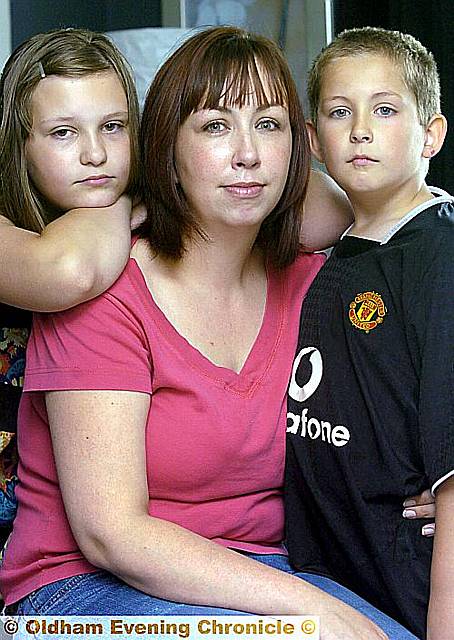Epilepsy drugs ‘harmed my two children’
Reporter: Richard Hooton
Date published: 27 July 2009

BATTLE . . . mum Suzanne with Bethany and Adam
A MUM is taking on two pharmaceutical giants over drugs she says caused her children serious disabilities.
Suzanne Wakeman (31), of Newark Park Way, Royton, claims anti-convulsant drugs she took for epilepsy while pregnant, damaged her children Bethany (11) and Adam (8).
She is part of a long-running group action against Sanofi-Aventis, the world’s third-biggest pharmaceutical company, over the drug Epilim, which goes to trial at London’s High Court in October.
And she is now suing Novartis Pharmaceuticals over Tegretol, with a writ issued for unlimited damages that will exceed £300,000.
Miss Wakeman, who suffered bad epileptic seizures from the age of 18 but is now seizure free, took Epilim while pregnant with Bethany but was not warned of any side effects. She was then changed medication to Tegretol while expecting Adam.
She was seven months pregnant when she discovered a leaflet that listed the symptoms of Foetal Anti-Convulsant Syndrome that it’s claimed the drugs cause — and realised with shock that Bethany had them and Adam would also be affected.
It’s claimed the drugs can cause learning and social difficulties, ADHD, facial abnormalities, vision defects, delayed speech and motor development. It is estimated 37,500 children have the syndrome in the UK.
Bethany has struggled to develop social skills and has epilepsy and temper tantrums. Adam is dyslexic, dyspraxic, autistic and has hearing difficulties.
While she dearly loves her children and wouldn’t change them for the world, she says they should not have been left to battle through life. Her two other children, Matthew (6) and Luke (3) are considered gifted and lead normal lives.
Miss Wakeman claims there are numerous reports, some dating back to the 1960s, of the effects of anti-convulsants on children but drug companies ignored them. She’s horrified at being kept in the dark on the health risks.
She said: “They knew what the drugs would do. The children’s lives should not be like this all because some drug company wanted to make a profit.
“It’s about informed choice that should not be taken away from people.” She says the legal action is about principles not money - but she would be reassured to know they are financially secure without her.
Miss Wakeman said: “They have to apologise for what they did to me and hundreds of other mums. They are multi-million pound companies but I don’t think their moral standards are very high. Business is business to them but it’s about my children.
“I hate the idea of the kids getting money as I think they should work for it. But Adam will probably never get a fantastically good job and will have to do something that fits in with his abilities. That’s not his fault and why should he or Bethany struggle on the breadline or on income support.”
Despite temper problems and every day activities leaving them exhausted, the children have done well at school and socially, with Adam defying doctors to ride a bike and play football.
A single mum, Miss Wakeman has held down jobs while leading the fight and caring for her children - and says she feels lucky as other children have been left with worse problems.
She added: “Adam’s a really good boy and does so well against the odds. He fights it all but he shouldn’t have to fight. Bethany nearly died 13 times from seizures as a child. She is doing very well and permanently trying hard. They work harder than most kids and are so brave.”
Law firm Irwin Mitchell is representing more than 200 families to bring the claims under consumer protection laws.
A spokesman for Sanofi-Aventis said most women with epilepsy deliver healthy children. It’s not known why an increased incidence of congenital abnormalities has been demonstrated in children born to mothers with epilepsy.
Doctors were provided warnings of possible effects in children born to mothers who take Epilim during pregnancy, as approved by regulatory authorities. Warning leaflets are now included with medication.
He added: “All anti-epileptic drugs are crucial to the health of those prescribed them and have passed stringent medical tests.
“We have every sympathy for people born with abnormalities and would advise women with epilepsy who may become pregnant, to speak to their doctor.”
Pregnant women on Epilim are urged not to stop their medication without speaking to a doctor as seizures can be fatal or harm the baby.
A Novartis spokeswoman said as it was an ongoing litigation they couldn’t comment.
Support group The Organisation for Anti-Convulsant Syndrome (OACS), which Miss Wakeman once chaired, is helping co-ordinate the legal action and has appealed for anyone affected to contact them on 01253 790022.
Most Viewed News Stories
- 1You can score free tickets to a Latics game while supporting Dr Kershaw’s Hospice
- 2Primary school in Uppermill considers introducing new ‘faith-based’ entry criteria to tackle...
- 3Public inquiry announced into rail upgrade that could leave villages ‘cut off’ for months
- 4Tributes paid following death of hugely respected Oldham community figure Dale Harris
- 5Trio arrested, drugs and weapons seized following Chadderton raid




